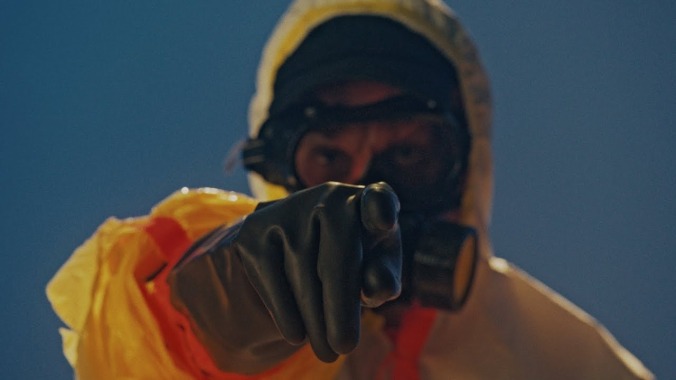Oneohtrix Point Never goes pop, then obliterates it on the excellent Age Of

There are harpsichords all over Age Of, electronic composer Daniel Lopatin’s eighth studio album as Oneohtrix Point Never. It’s an instrument that Lopatin derides in press materials as a “perfectly dumb machine”—one that always reverberates the same, no matter how you strike the keys. That sound, reminiscent of parlors and powdered wigs, is used here to evoke the long, lingering continuity of the history of music, if not civilization itself. And it’s one Lopatin, with typical fervor, immediately sets about tearing to pieces—warping those stately, sophisticated tones, then slashing them with digital screams in the title track; echoing them against themselves until they collapse into an indistinct clangor on “Myriad.industries.” It’s all part of the record’s loosely sketched concept of an advanced world going mad and self-immolating, leaving behind a (surprisingly sentimental) artificial intelligence to pick through their cultural detritus. Admittedly, this is a lot of nuance to ask of something so monotonous as the harpsichord. But as always, Lopatin makes every modulated note say exactly what he wants.
He also finds a relatively new way with Age Of, his first album to prominently feature vocals on half its songs—some of them even approaching a genuine, if jagged form of pop. This makes sense. Lopatin is currently one of the most famous electronic artists in the world, his crossover appeal particularly notable for someone who makes music as dizzying and deconstructed as his own. Last year’s pulsing, Tangerine Dream-y score for the Safdie brothers’ Good Time made him a critical darling, even outside of critics who listen to experimental synthesizer music. He’s toured with Nine Inch Nails and staged pieces at the MoMA; he’s collaborated with Iggy Pop, David Byrne, and FKA Twigs. Age Of is being released amid the arguable peak of that mainstream exposure, and it seizes the moment by offering up some of Lopatin’s most “songful” compositions since his days in Ford & Lopatin. The result is a remarkably accessible, yet still resolutely avant-garde work, with Lopatin taking various musical forms—cough-syrupy R&B jams, country ballads, baroque chamber pop—and wresting unexpected nuances out of them, the same way he does that harpsichord.
He has some help. ANOHNI, whose Hopelessness album and Paradise EP both featured Lopatin’s contributions, twice returns the favor—singing an off-kilter torch song over the drowning jazz of “Still Stuff That Doesn’t Happen,” and bringing typical grace and wounded humanity to “Same,” whose Gregorian-chant-like mantra is lifted by an ever-rising choir out of a shower of digitized breaking glass. Venerable New York noisenik Prurient (Dominick Fernow) similarly appears on two tracks, layering in industrial hiss and a distorted, death-metal scream on the otherwise gentle croon of “Babylon,” then huffing and moaning, “In the glass house, it’s disgusting,” over the stuttered synthetic voices of “Warning.” James Blake is in there, too, though he doesn’t sing, instead playing something Lopatin calls “sideways ragtime” piano on “We’ll Take It” over gibbering loops of sped-up chipmunk laughter and a Terminator-stomp of machinery. Although, good luck identifying a sound so prosaic as piano amid all its ominous warps and bends.








































